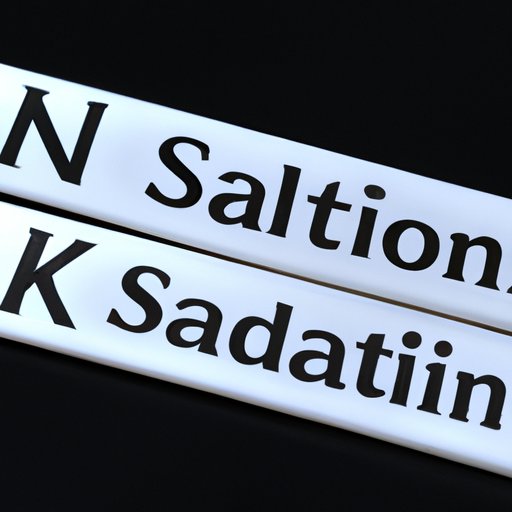
Introduction
You might have heard that consuming too much sodium can lead to weight gain. But how does sodium actually impact your body, and what can you do to reduce sodium intake and promote weight loss? In this article, we’ll explore the link between sodium and weight gain, and provide practical tips and strategies for reducing sodium in your diet in a way that supports weight loss and overall health.
The Link Between Sodium and Weight Gain: What Science Tells Us
Sodium is an essential mineral that helps regulate fluid balance and blood pressure in the body. But consuming too much sodium can lead to excess water retention, which can make you feel bloated and contribute to weight gain. Studies have also found that excess sodium intake can increase insulin resistance and inflammation in the body, both of which have been linked to obesity and weight gain.
How Cutting Back on Sodium Can Help You Lose Weight
If you’re looking to lose weight, reducing sodium intake can be a simple and effective strategy. One study found that reducing sodium intake from 3,300 mg per day to 1,500 mg per day led to an average weight loss of two pounds over 12 weeks. Plus, cutting back on sodium can help reduce bloating and puffiness, making you feel leaner and more comfortable in your clothes.
So, how can you reduce sodium intake in a way that supports weight loss without sacrificing flavor? Try these tips:
- Read food labels: Many processed foods are high in sodium, so be sure to check the nutrition facts label before you buy. Look for options that are lower in sodium or consider making your own meals at home from whole, fresh ingredients.
- Choose lower-sodium options: When shopping for items like canned goods or condiments, look for lower-sodium options.
- Experiment with herbs and spices: Try using fresh herbs and spices to add flavor to your meals instead of relying on salt or sodium-heavy seasoning blends.
- Be mindful at restaurants: Restaurant meals are often high in sodium, so be mindful of your choices and ask for dressings or sauces on the side so you can control how much goes on your food.
The Surprising High-Sodium Foods that Can Sabotage Your Diet
Some foods that you might not expect to contain high levels of sodium include:
- Bread and baked goods
- Cottage cheese and other dairy products
- Sauces and condiments like ketchup, soy sauce, and salad dressing
- Canned soups and vegetables
- Processed meats like deli meat, bacon, and sausage
While you don’t need to completely cut these foods out of your diet, being aware of their sodium content can help you make more informed choices and reduce your overall sodium intake. Look for lower-sodium alternatives or consider making your own versions of these foods at home.
Sodium vs. Potassium: Which One Has More Impact on Your Weight?
While sodium has been linked to weight gain, potassium is another mineral that plays a role in regulating fluid balance and blood pressure in the body. In fact, consuming more potassium may actually help counteract the negative effects of excess sodium and lead to weight loss.
Research has found that consuming more potassium can help reduce water retention and bloating, which can make you look and feel slimmer. Plus, potassium-rich foods like fruits and vegetables also tend to be lower in calories and higher in fiber, both of which can support weight loss.
The Role of Sodium in Water Retention and Its Effect on Weight
One of the main ways that sodium impacts weight is through its effect on water retention in the body. When you consume excess sodium, your body holds onto more water to maintain fluid balance. This can lead to feelings of bloating and puffiness, and may contribute to weight gain on the scale.
The good news is that reducing sodium intake can help reduce water retention and promote weight loss. In addition to the tips and strategies mentioned earlier, you can try the following to reduce water retention:
- Drink plenty of water: It might sound counterintuitive, but drinking more water can actually help flush excess sodium and fluids out of your body.
- Eat more potassium-rich foods: As we mentioned earlier, potassium helps counteract the negative effects of excess sodium and reduce water retention. Aim for at least five servings of fruits and vegetables per day to boost potassium intake.
- Exercise regularly: Physical activity can help promote fluid movement in the body and reduce water retention. Aim for at least 30 minutes of moderate-intensity exercise most days of the week.
Simple Steps to Reduce Sodium Intake and Prevent Unwanted Weight Gain
To recap, reducing sodium intake can be a simple and effective way to support weight loss and overall health. Here are some additional easy steps you can take to reduce sodium in your diet:
- Choose fresh, whole foods whenever possible
- Use herbs and spices to add flavor to your meals instead of relying on salt
- Cook more meals at home so you can control the ingredients and sodium content
- Be mindful of sodium in condiments and dressings
- Opt for lower-sodium options when shopping for packaged foods
Conclusion
Reducing sodium intake can be an effective strategy for promoting weight loss and overall health. By paying attention to your sodium intake and making small changes to your diet and lifestyle, you can reduce water retention, avoid bloating and puffiness, and feel more comfortable and confident in your body.




